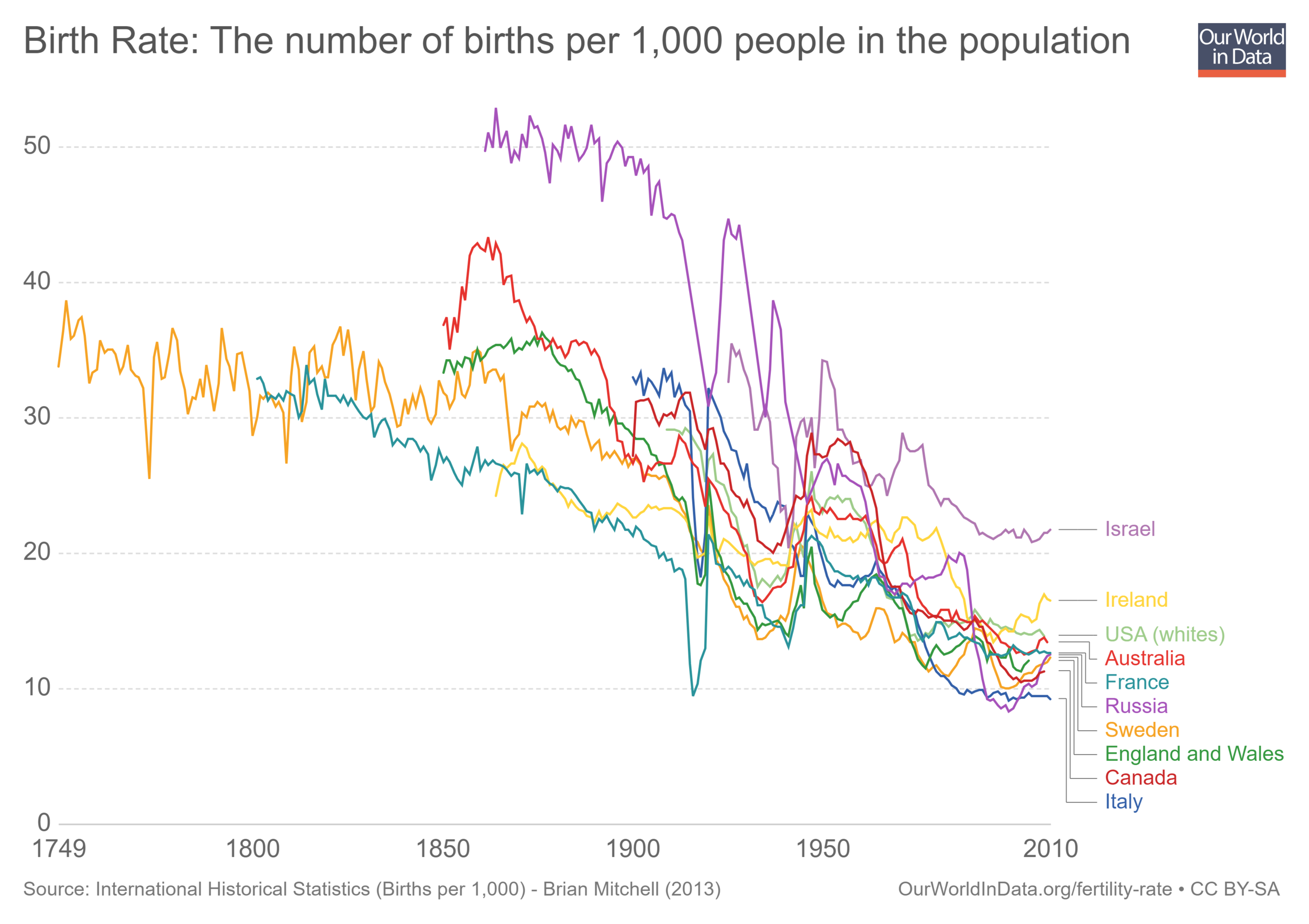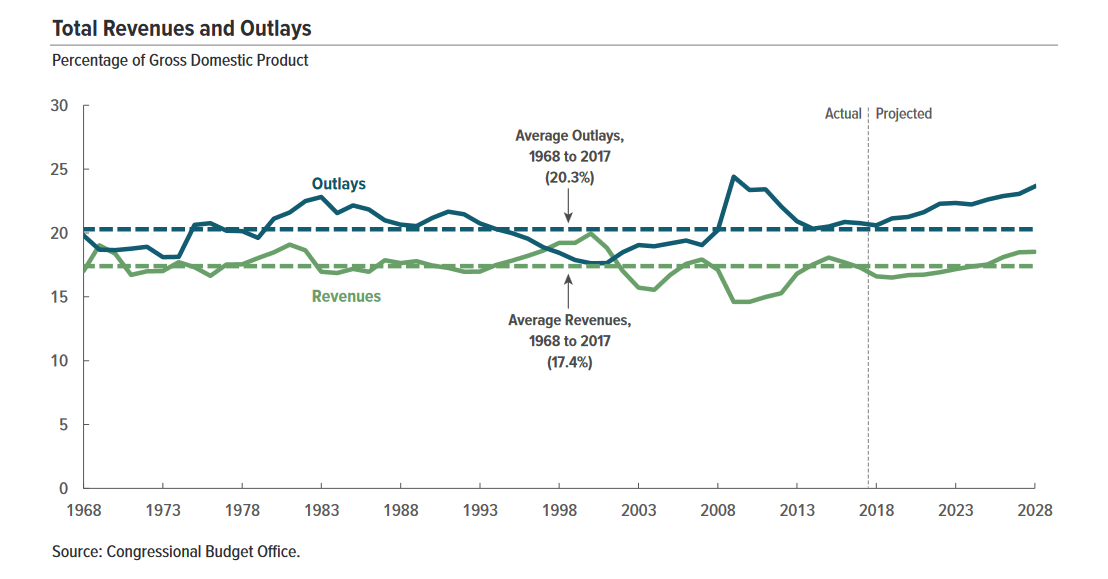The Long View 2007-01-01: Whatever Can't Continue Won't
Here is John J. Reilly’s New Years’ predictions for 2007. Let us see how he did:
- The Sunni Insurgency in Iraq. Flat wrong. This went on for another four years or so. And even after it petered out, the former Ba’athists enabled the later rise of ISIS.
- Sub-replacement birthrates in advanced countries. Somewhat right. I was a little surprised by this one, since the US seems to be a bit of an outlier. Look at this chart, and then go look at any set of countries you want in the data set. There really was an uptick in several advanced countries in the late 2010s.

- US Federal Deficit Spending. Tax revenues were trending up at the time. There was a huge jump shortly thereafter, but that was the housing bubble, and almost no one got that right.

US Federal Total Revenues and Outlays
By Congressional Budget Office - https://www.cbo.gov/publication/53651, Public Domain, https://commons.wikimedia.org/w/index.php?curid=69489104
- Barack Obama. Clearly wrong. John’s partisanship probably didn’t help.
- The Political Invective Industry. Also wrong. John missed out on Twitter.
- Embryonic stem-cell research. Mostly right. The science really isn’t good on this, and John correctly perceived this.
- Skepticism about climate change becoming a fringe phenomenon. Right on. This has definitely moved beyond the pale.
- This wasn’t in the bulleted list, but John also correctly noted that the replacement for the Reaganite conservatism post GWB was going to be 1970s style identity politics.
Whatever Can't Continue Won't
If you are reading this, then I survived this year's New Year's Eve party: the point is uncertain as I write this on the preceding afternoon. So, in the spirit of gratitude for small favors, we will make a modest excursion down the via negativa. Here are some things that, I am pretty sure, will pass their sell-by date in 2007:
The Sunni Insurgency in Iraq: The traditional position of the Sunni minority in Iraq became untenable the last time Saddam Hussein left his office in 2003. The only question was whether they would exchange that position for a part in a national coalition, or whether they would prefer to be ethnically cleansed. Surprisingly (and some fraction of US bafflement about what to do next in Iraq arises from this), they have been leaning toward Option B. Time for them to change their mind is running out: this is the year when the Iraqi government will begin to have the military resources to conduct its own policy.
Sub-replacement Birthrates in Advanced Countries: This is not going to turn around in a year, but there has been considerable discussion of the issue and the beginning in France, Japan, and Australia of serious pro-natal programs. The issue could begin to surface in US politics this year: the matter has already been raised as one of the public-policy objections to gay marriage.
US Federal Deficit Spending: The predicate for this was always the position of the US dollar as the world's reserve currency: the money markets would absorb all the debt the US federal government chose to issue. There are good reasons for supposing that the US dollar will remain the principal reserve currency. I also don't quite see how there could be a run on the dollar: who would the dollars be sold to? However, the advent of the euro as an alternative currency means that there will now be upward pressure that was not there before on interest rates. We may see the Chairman of the Federal Reserve telling Congress that he cannot promise that there will be an adequate market for US sovereign debt unless the federal government increases taxes.
Barrack Obama: Perhaps his enemies arranged for him to have this much public exposure so early in his career. The result is the worst of all possible worlds: both a blank record and a a trailing pack of opposition political operatives eager to magnify his missteps.
The Political Invective Industry: Since the great age of snarky commentary began with the Clinton Administration, this has been a one-sidedly Republican enterprise. Throughout the period there have been Democratic editorialists at least as unhinged as their Republican colleagues, of course, but none was as much fun as, say, Rush Limbaugh or Ann Coulter: certainly none was as popular. Now, however, they cannot claim to be the voice of a populist majority. They also suffer from a lack of risible opponents. The new Democratic Congressional leadership may do some very foolish things, but there is no Newt Gingrich among them to symbolize their malefactions. Meanwhile, the bitter and second-rate Democratic commentariat has further cause for bitterness in that they are the dog that caught the car. They have already discredited George Bush to their own satisfaction, but the very fact the Republicans lost an election discredited their darker fantasies.
Embryonic Stem-Cell Research: Forgive me if I repeat myself, but this is looking more and more like a scam. Half the research money for the medical uses of stem cells (which in general do show promise) is going into the approach that presents the greatest theoretical difficulties and which is least likely to be of clinical use. The enthusiasm for embryonic stem-cell research differs from the enthusiasm around 1990 for cold fusion (which also got some public funding, by the way) in that the cold-fusion scientists believed what they were saying.
Skepticism about Climate Change: I think that this is the year when disbelief in climate change moves from minority opinion to fringe idea. The science more or less supports substantial recent climate change. The science also supports human activity playing a role. Be that as it may, the persuasion of the public in this matter has more to do with the fact the media have made it their business to report weird weather. That's not to say that weird weather is far to seek. It snowed in southeast Australia just before Christmas. That's like snow in Chicago in July.
Actually, what's most remarkable about the world today is the lack of plausible alternatives. The Reaganite conservative movement in the United States is dead, partly because its original deregulation agenda has been achieved and partly because it proved corruptible and inflexible in power. The opposition, however, stands for nothing but the multiculti patronage politics that could not tolerate the light of day in the 1970s and which has not improved with age.
Similarly, the international institutions designed to be the instruments of a small alliance of stable nation states has now become like a residential property whose apartments have been subdivided far past the point of safety and whose pipes and wiring are being stolen by the building managers in connivance with some of the owners. The only alternative offered to this system is American hegemony, an institution with no inherent legitimacy in the law of nations or, just as important, any institutional mechanism for coupling the hegemonic function to domestic politics or government.
I could go on in this vein, and indeed I will: that's why people have blogs. On the whole, though, I am not impressed by our problems. History is often more confusing than it is today.
Just watch.
Copyright © 2007 by John J. Reilly
Support the Long View re-posting project by downloading Brave browser. With Both Hands is a verified Brave publisher, you can leave me a tip too!




Comments ()